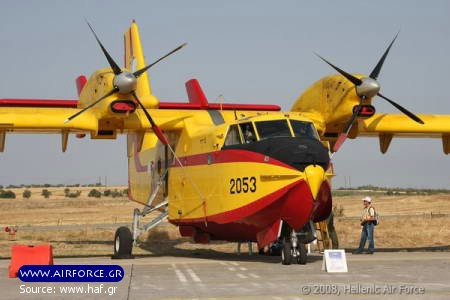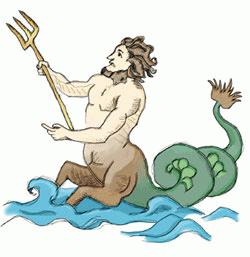383 MEEA - Special Operations & Air Fire Fighting Squadron "Proteus"
|
383 ΜοίÏα Ειδικών ΕπιχειÏήσεων & ΑεÏοπυÏόσβεσης
We thank Chariton Charousis for the donation.

The squadron’s name is associated to the sea, the daily contact with which dominates the squadron’s mission.
According to the Greek mythology, Proteus was one of the Atlases who held the earth. Escorting Poseidon, he was also a god of the sea and had the special ability to transform to many shapes.
The emblem of the 383 Squadron represents the eternal fight between good end evil with the domination of the water (blue eagle) against the disastrous fire (red dragon).
The Hellenic Air Force roundel has a notable place in the composition. The squadron’s motto says «We passed through fire and water» and comes from St. Kosmas Etolos’s last words to his Turk executioners. The motto schematically represents the cycle, taking and dropping water to the fire. This process characterizes the squadron’s operational method.
One of the younger HAF squadrons, the 383 Special Operations & Air Fire Fighting Squadron was formed on May 16th, 2003, as a result of the splitting of thev 355 Tactical Transport Squadron (TTS).
The squadron has 10 CL-415 in its inventory, the delivery which started in January 1999 to the 355 TTS, at Elefsis air base (112 CW). The 338 Sqn operates with the CL-415, in aerial fire fighting, tactical transportation and search and rescue missions.
The Squadron’s particular role, the fire fighting, is one aspect of the Air Forces’ social contribution to the Country and the citizens. The airplanes of 383 Sqn fight forest fires, which destroy the natural resources of our country and the property of Greek people.
In addition to fire-fighting, the CL-415 airplanes patrol the high risk areas throughout the whole country in order to prevent and extinguish forest fires as soon as possible. They also provide search and rescue to vessels throughout the Mediterranean territory.
In the frame of our foreign affairs policy, we support other countries which were hit from disastrous fires. The Squadron since its establishment participated to fire fighting missions in France (2003) and Portugal (2004), while the crews and squadron’s airplanes contributed to fire fighting in Turkey (TURPAS refinery after the earthquake of 1999) and in Cyprus (2001 – 2002), when they served in the 355 TTS.
From 2003 until 2006, during the summer period, the Squadron operated simultaneously from 112 CW and other airports, where fire fighting detachments are formed according to the Fire Brigade’s annual demands. During the summer period, operational control of the aircraft is assumed by the Fire Brigade
The airplanes are based at the 113 CW and 117CW airports, while redeployed as detachments all over the country (i.e. Heraklion, Souda, Rodos, Karpathos, Kalamata) where fires break out.
Of major importance was the contribution to the protection during the Olympics in 2004,as well as the extinguishing of large forest fires to N. Voutzas and to Gramatikon after the HELIOS airliner crash in 2005.
In 2006, after a Supreme Air Force Council decision, the squadron is based to the «MACEDONIA» airport, Thessaloniki.
During the winter period, the squadron is in readiness for aerial fire fighting and rescue missions.
The squadron’s main role is the aerial firefighting, a very demanding task, especially during the filling-up of the water tanks from sea and during airdrops, taking into account that an airdrop takes place from an altitude of aprox. 100 ft. In addition, the crews are in a continuous 15 minute alert.
Apart from the aerial firefighting, readiness and SAR missions are carried out from the squadron. For the SAR missions two rescue personnel are added to the crew and the airplane is equipped with a liferaft for picking up survivors.
PROTEUS
In Greek mythology, Proteus (Î ÏωτεÏÏ‚) is an early sea-god, one of several deities whom Homer calls the "Old Man of the Sea", whose name suggests the "first", as protogonos (Ï€Ïωτόγονος) is the "primordial" or the "firstborn". He became the son of Poseidon in the Olympian theogony (Odyssey iv. 432), or of Nereus and Doris, or of Oceanus and a Naiad, and was made the herdsman of Poseidon's seals, the great bull seal at the center of the harem. He can foretell the future, but, in a mytheme familiar from several cultures, will change his shape to avoid having to; he will answer only to someone who is capable of capturing him. From this feature of Proteus comes the adjective protean, with the general meaning of "versatile", "mutable", "capable of assuming many forms": "Protean" has positive connotations of flexibility, versatility and adaptability.

|
|
![]() THE PRODUCTS ABOVE ARE RELATED TO HELLENIC AIR FORCE. THEY ARE ONLY DISPLAYED HERE & SOLD VIA EBAY INC. WWW.AIRFORCE.GR IS NOT IN ANY WAY RESPONSIBLE FOR THEM.
THE PRODUCTS ABOVE ARE RELATED TO HELLENIC AIR FORCE. THEY ARE ONLY DISPLAYED HERE & SOLD VIA EBAY INC. WWW.AIRFORCE.GR IS NOT IN ANY WAY RESPONSIBLE FOR THEM.![]() THIS WEB-SITE DOES NOT BELONG OR SPONSORED BY THE HELLENIC AIR FORCE IN
ANY WAY. OPINIONS THAT EXPRESSED IN ITS PAGES DO NOT NECESSARILY AGREE
WITH THE WEBMASTER OR THE HELLENIC AIR FORCE. INFORMATION CAN BE USED
ONLY FOR REFERENCE OR EDUCATIONAL REASONS. OFFICIAL EMBLEMS ARE
COPYRIGHTED BY THE HELLENIC AIR FORCE, PROTECTED BY THE HELLENIC LAWS
AND CANNOT BE COPIED OR REPRODUCED BY ANYONE WITHOUT THE APPROPRIATE
PERMISSIONS.
THIS WEB-SITE DOES NOT BELONG OR SPONSORED BY THE HELLENIC AIR FORCE IN
ANY WAY. OPINIONS THAT EXPRESSED IN ITS PAGES DO NOT NECESSARILY AGREE
WITH THE WEBMASTER OR THE HELLENIC AIR FORCE. INFORMATION CAN BE USED
ONLY FOR REFERENCE OR EDUCATIONAL REASONS. OFFICIAL EMBLEMS ARE
COPYRIGHTED BY THE HELLENIC AIR FORCE, PROTECTED BY THE HELLENIC LAWS
AND CANNOT BE COPIED OR REPRODUCED BY ANYONE WITHOUT THE APPROPRIATE
PERMISSIONS.